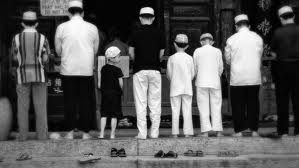For most Muslims around the world, the month of Ramadan marks a yearly renewal, a time to turn inward in spiritual reflection, upward to God in worship, and outward toward other human beings in acts of charity. It is a time when many Muslims who do not offer the five required daily prayers or have much to do with religion for the rest of the year still refrain from food, drink, and sex during the daylight hours of an entire lunar month for the sake of God. Among the five pillars of Islam it is the fast of Ramadan, not the daily prayers, that is the most universally observed Muslim practice worldwide, behind only belief in God and the Prophet Muhammad. People fill mosques at night to offer extra prayers in congregation, and some even spend part or all of the last 10 days of Ramadan in a state of spiritual seclusion following the example of the Prophet. It is a month when many Muslims pay their yearly required alms (zakat) and when generosity reaches its peak in Muslim societies, especially through giving free break-fast meals (iftar) to the poor.
In a way, Ramadan combines the spirit of Christmas with the inwardness of the Easter season. Indeed, Muslims consider Ramadan to be the month that the Word of God (the Quran) first descended into the world through the revelation to Muhammad, as Christmas is the time when the Word of God (Jesus) came into the world through the virgin birth.
The Ramadan fast is marked by its anonymity and intimacy with God. The Prophet said that God says, “Every good deed is [rewarded] 10 times its like, up to 700 times, except for fasting. It is for Me, and I will reward it.” No one but God can see you fast. The Prophet said that especially while fasting one should not shout or return insults, but respond to an abuser by saying, “I am fasting. I am fasting.”
Just a day without food and one realizes how fragile the body is, how it becomes harder not only to move but even to think! It is a bodily experience of emptiness and poverty that Sufi Muslims say should be the state of the soul before God at all times. Muslims are reminded of the dependence of human beings upon that which is other than themselves for their happiness, and through the daily Ramadan ritual they practice breaking free of even their wholesome and licit desires in order to turn inward. It is an exercise of the spiritual heart overcoming the ego. The Prophet directed Muslims to the inner nature of the fast by warning, “Many people get nothing from the fast but hunger and thirst.”











 رد مع اقتباس
رد مع اقتباس